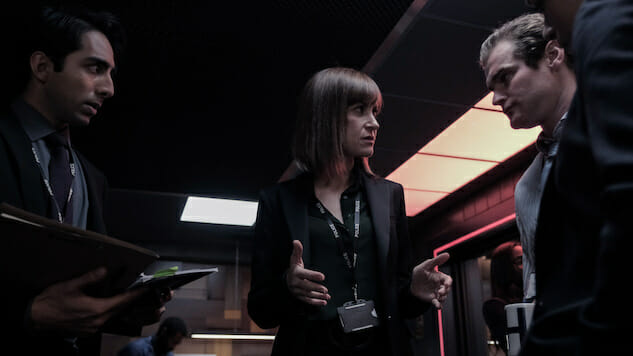Introducing Endless Mode: A New Games & Anime Site from Paste
The best part of most crime shows involves the interrogation of the perps by tough cops or idiosyncratic specialists. So why not cut out all the fluff and get right to that juicy and climactic tête-à-tête? That’s what Netflix’s international new series Criminal tries out in the UK, France, Germany, and Spain. Each episode takes place in an interrogation room, its observation area, and the hallway connecting them. It’s a crime show that’s only interviews, only confessions, only the parts of Law & Order right before the lawyer bursts in—brow furrowed—and says “My client has nothing more to say.” But its style, all delicious comeuppance dessert, doesn’t work nearly as well as series that invest in the veggie-eating groundwork. Mindhunter has the best conversations in the crime business at the moment because unlike Criminal, it ties everything back to the real world.
I watched one episode from each of the four countries represented by the series, which showrunners George Kay and Jim Field Smith have stocked with different directorial and acting talent. David Tennant shows up as a tight-lipped professor suspected of murder. Sara Giraudeau plays a mass shooting survivor suspected of stretching the truth. While each country’s cases are listed as a different show on Netflix, the structure and style is so similar that they’re really only separated by language. And actually, not even that, considering that each episode comes with a dubbed (and rewritten) English track. While I recommend the original audio (because the acting is far better), it doesn’t help the dull plots or botched format.
With the restrictive format in place, the quality of each episode comes down to the ability of the creative team to rise to the occasion. It’s almost like how 48 Hour Film Projects (where contestants are asked to create an entire short film over a weekend) and their ilk can either push people to innovate or highlight sloppiness. As a director, Smith shows the most flair with the camera of the four, while Mariano Barroso conducts his actors with a more entertaining hand than the rest. Mostly, though, it’s a lot of sitting and staring that’s never as tense or engrossing as it wishes it was.
The stagey aesthetic immediately makes the show feel like a series of overwritten soliloquies, cartoonish criminals, and telegraphed reveals more entwined with personality than reality. A few snippets of sideline office politics and relationships are often the most interesting things in the story, where the actors outside the interrogation room bubble can find scraps of humanity to give much-needed context to the proceedings. Stories without exposition work great, but they have to solve the problems of ditching setup (establishing context, stakes, etc). That’s hard to do, and why most TV and film is bloated with exposition. Criminal can’t pull it off. While the cases are hinged upon strange twists and off-the-wall premises, the writing connecting the two isn’t clever cat-and-mouse logical maneuvering. Instead, it’s more like Tom sneaking around a fence to bop Jerry over the head with a big mallet. They’re all just hurrying to the big pop at the finish line.
Take that unsolvable-yet-heavily-foreshadowed, eye-on-the-prize dedication to a thin narrative and put it into a plodding, methodical pace that mimics a real police interrogation. The resulting mess shows where intention and execution part ways. Instead of achieving the psychological goals inherent to police tactics—building tension, making us uncomfortable, or even titillating our inner sicko as we lean in to find out the truth—the only common desire Criminal’s play-like stagnancy elicits is one to get out. And no episode I saw was even an hour. If a criminal is avoiding eye contact, everything’s gone according to plan. If I’m avoiding eye contact with Criminal, nothing has.
To paraphrase David Fincher, a lot of police work is sitting around in small rooms drinking bad coffee. Not to bring it all back to Mindhunter, but that show takes what should be boring police procedural activities and makes them ways to establish the pavement-pounding dedication of its earnest central characters. Contrasted with the equally-dedicated yet boldly deviant evil that they’re after, they create an engine of opposites—like an electric motor driven by the invisible push of magnets. Criminal’s two sides, interrogator and interrogatee, simply don’t have the characterization or passion to keep its hyper-realistic war waging. The actors do their best with their scripts, but Sir Arthur Conan Doyle-esque twists answer each too-subtle premise. A tactical disconnect hamstrings a competent cast and makes each case’s resolution feel as transparent as the right side of the one-way glass.
Criminal premieres Friday, September 20th on Netflix.
Jacob Oller is a film and TV critic whose writing has appeared in The Guardian
, The Hollywood Reporter
, Vanity Fair
, Interview Magazine
, Playboy
, SYFY WIRE
, Forbes
, them
, and other publications. He lives in Chicago with his two cats and a never-ending to-do list of things to watch. He likes them (the cats and the list) most of the time. You can follow him on Twitter here: @jacoboller.